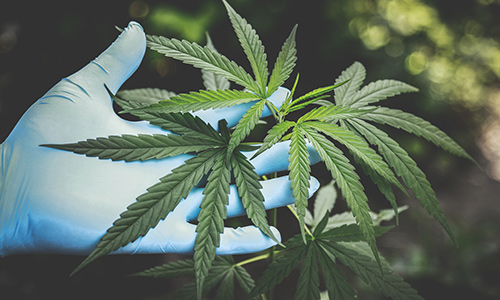The last United States election represents a paradigm shift in drug policy, says U of A Augustana professor
Geraint Osborne - 12 March 2021

"The drug war is over; drugs won," says professor Osborne. "Drugs must be better regulated through decriminalization or legalization, and more resources need to be given to harm reduction and invested into communities and social programs."
In the last United States election, Americans didn’t just elect a new president: they also sent a clear signal about their dissatisfaction with the failed war on drugs and their support for a much-needed paradigm shift in drug policy.
While much will be written about the tumultuous 2020 election, what is of special interest to those working in drug policy reform are the changing public attitudes regarding how drug use should be regulated. Most notable was the fact that, despite their polarization, there was considerable consensus among Americans when it came to drug policy and rejecting the status quo. Wherever cannabis legalization was on the ballot, people decisively voted in favour of it, regardless of whether they were progressives or conservatives.
Arizona, New Jersey and Montana, where medicinal cannabis was already legal, voted to legalize cannabis for recreational use. Mississippi legalized cannabis for medicinal use while South Dakota became the first state to legalize medical and recreational cannabis at the same time, which brings the national tally of states where cannabis is legal for medicinal use to 35 and to 15 states where it is legal recreationally. According to Politico, one-third of Americans live in a state where recreational cannabis use is legal.
The citizens of Oregon delivered the biggest defeat to drug war advocates by overwhelmingly voting to pass Measure 110, which decriminalized the personal, non-commercial use of all drugs, such as cocaine, meth and heroin. They also voted to fund an urgently needed network of treatment, recovery and harm reduction services using millions of dollars in tax revenue from legal cannabis sales and funds that would have otherwise been spent on policing and incarceration.
The United States is playing catch up with what has been slowly happening across the globe: Canada, Georgia, South Africa and Uruguay have legalized recreational cannabis use and another 43 countries have decriminalized cannabis. A policy of limited enforcement has also been adopted in other countries, such as the Netherlands, where the sale of cannabis has long been tolerated at licensed coffee shops. Over 45 countries have legalized cannabis for medical use, which is typically the first step towards legalizing recreational use.
Why the change in recent years? Drug war fatigue is spreading, and people are getting wise. For 100 years, the United States led global drug war has done nothing but wreak havoc in communities, especially those that are racially marginalized. People are exhausted and disgusted with a racist, violent, draconian, harmful and ultimately ineffective system for dealing with substance use and addiction. They recognize that drug use is not a criminal justice issue, but rather a matter of public health, mental health and human rights and freedoms.
Additionally, states are catching on to how cannabis can stimulate local economies by boosting state tax revenue and creating jobs. In 2019, Colorado recorded over $1 billion in cannabis state revenue since its legalization in 2014, and California surpassed $1 billion in cannabis tax revenue a mere two years after statewide legalization in 2018. In Canada, in the first fiscal year of cannabis legalization, the government took in $18 million in cannabis tax revenues, and the following year $66 million. The government believes revenues will rise to $135 million in 2020-2021.
These funds will be channeled into harm reduction initiatives that have proven to be more successful in combatting drug abuse and saving lives. Arguably, Portugal is the canary in the coal mine. While not legalizing drugs, Portugal decriminalized all drugs with positive results over the last 20 years, especially a decrease in HIV infections and drug-related deaths and crime.
Families, and communities devastated by drug abuse, along with frustrated health professionals, will continue to pressure governments—as they are in British Columbia—to better regulate all drugs through decriminalization or legalization, pour more resources into harm reduction and invest in communities and social programs. The drug war is over; drugs won. It’s time to embrace the paradigm shift and develop new strategies for regulating drugs and minimizing the harms associated with them.
Geraint Osborne, Sociology, Augustana Campus, University of Alberta. This column was originally published in the Camrose Booster on February 23, 2021.